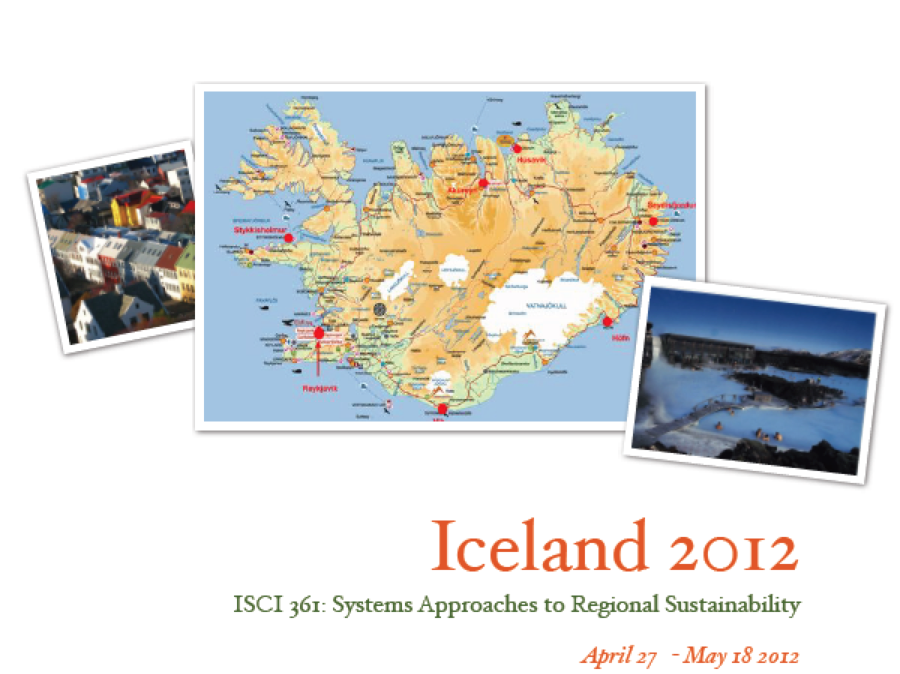Contemporary scientists agree that solutions to complex global challenges such as environmental sustainability calls for “systems thinking”: the process of understanding how things influence one another within a whole. Systems thinking as an approach to problem-solving argues that the component parts of a system can best be understood in the context of relationships with each other and with other systems, rather than in isolation.
A scientific approach to examining the world that embraces systems thinking therefore demands that we consider landscapes, regions or whole continents as systems. In these systems, elements such as land, air, water, human societies, plants, and animals, interact in ways that influence the likelihood that the system will survive or perish.
This three-week, three-credit summer intensive field course builds on ISCI 360, in which students examined the complex interconnecting components that contribute to the nature and status of the present-day system of a country, a region or a city. You will visit Iceland, which as a completely self-contained nation-state “system”, offers a particularly valuable case study.
This summer intensive field course will offer you an opportunity to visit and experience Icelandic land, ecosystems and communities first-hand, and to hear perspective from locals and local experts on contemporary and historic factors influencing sustainability in the Icelandic system.
In addition, the field course will function as a data-gathering field trip for you to pursue a pre-selected research project investigating possible effects of perturbations of (in this case) the Icelandic system.
To understand sustainability, we also need to understand unsustainability. We have deliberately adopted systems thinking as the approach for ISCI 361, using the logic that any region of the world needs to be understood as an integrated system before we can understand what will happen when that system is perturbed. Systems thinking as an approach to problem-solving argues that the component parts of a system can best be understood in the context of relationships with each other and with other systems, rather than in isolation. A scientific approach to examining the world that embraces systems thinking therefore demands that we consider landscapes, regions or whole continents as systems. In these systems, elements such as land, air, water, human societies, plants, and animals, interact in ways that influence the likelihood that the system will survive or perish.
In ISCI 361, we will visit and examine Iceland as a ‘case study’ region of the world. With assistance from the University of Iceland’s Institute for Sustainability Studies, we will spend a week in Reykjavik, learning from a range of Icelandic experts about topics ranging from human settlement of Iceland to the role of geothermal energy generation in the Icelandic economy. We will then spend two weeks travelling around Iceland, visiting a number of academic centres, national parks and sites of ecological, geothermal and glaciological interest. We will consider input from multiple scientific (and some social science) disciplines to answer a myriad of questions about the Icelandic system and its sustainability. How does the underlying geology of Iceland affect its water systems and agriculture? What advantage does geothermal energy offer this small nation state? To what degree is Icelandic hydrolectric energy – dependent on glacial rivers – sustainable? How do the climate and geology of Iceland affect its ecosystems and agriculture? What special advantages and challenges are unique to this area of the earth system?
Course goals
By participating in ISCI 361 you will:
- Gain hands-on experience in applying principles of systems thinking to scientific investigation of a selected region of the world.
- Gain field research experience through investigation of a local sustainability challenge as a team research project.
- Gain experience in developing a research plan and presenting it to your peers.
Overall course learning objectives
After completing ISCI 361, you should be able to:
- Describe the ‘three dimensions’ model of sustainability, and discuss its applicability to the Icelandic system, giving illustrative examples.
- Be able to apply the ‘earth systems science’ analytic framework in order to investigate events and perturbations in the Icelandic system.
- Describe key principles of systems thinking, and give examples of the utility of a systems approach when studying the Icelandic context.
- Outline the connected factors that have influenced evolution of the Icelandic system, and discuss some of the contributions of different scientific disciplines to their study.
For more information visit Go Global

